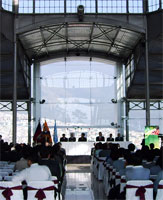UNESCO’s IFAP ends e-government project in Latin American World Heritage cities
18-12-2008 (Quito)

The closing ceremony
© UNESCO
The ‘Electronic Government Model for World Heritage Cities’ project, launched by UNESCO’s Information for All Programme (IFAP) in 2006 and financed by the Government of Spain through its Ministry of Public Administration, was officially closed in Quito on 24 November.
During the ceremony chaired by Quito’s Mayor, Mr Paco Moncayo, representatives of the three participating cities, Cartagena de Indias (Colombia), Cusco (Peru) and Quito (Ecuador), shared the experiences derived from the project and evaluated its results.
The project succeeded in sensitizing local governments and citizens on the benefits of e-government services as well as in promoting the use of ICT to foster transparency and accountability, while encouraging citizens’ participation in decision-making processes at the municipal government level. The right to access information was the underlying principle in each of its different components.
The project was three-pronged:
A curriculum for an Electronic Government Chair was also developed in order to ensure that educational institutions are in a position to provide future decision-makers and public civil servants with quality training in the e-government field.
Finally, a local chiva, the traditional Ecuadorian bus traveled through Quito motivating and training citizens to use the Internet and to search for information in the municipal websites.
A second phase of the project is currently under study. This new phase would allow expanding the scope of the project by including additional World Heritage sites, so as to further harness ICT for building more democratic, participative and transparent societies, particularly in cities with an extraordinary cultural heritage.
The project succeeded in sensitizing local governments and citizens on the benefits of e-government services as well as in promoting the use of ICT to foster transparency and accountability, while encouraging citizens’ participation in decision-making processes at the municipal government level. The right to access information was the underlying principle in each of its different components.
The project was three-pronged:
- it provided institutional training and capacity building to some 1,000 civil servants responsible for processing and managing public information - be it in the municipality or in its associated institutions, such as libraries, museums and archives;
- it promoted citizens’ participation by training more than 2,000 community members in ICT use and information research; and
- it equipped the cities with 20 public access points where citizens can easily use e-government services and search for information.
A curriculum for an Electronic Government Chair was also developed in order to ensure that educational institutions are in a position to provide future decision-makers and public civil servants with quality training in the e-government field.
Finally, a local chiva, the traditional Ecuadorian bus traveled through Quito motivating and training citizens to use the Internet and to search for information in the municipal websites.
A second phase of the project is currently under study. This new phase would allow expanding the scope of the project by including additional World Heritage sites, so as to further harness ICT for building more democratic, participative and transparent societies, particularly in cities with an extraordinary cultural heritage.
Related themes/countries
· Colombia
· Ecuador
· Peru
· Information for All Programme (IFAP)
· Access to Information: News Archives 2008
· E-Governance: News Archives 2008
Share this story:
Contact information
- UNESCO
Source














